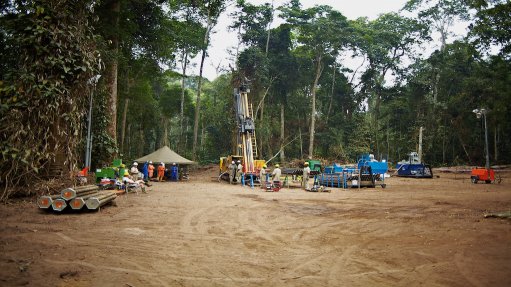
Photo by: Kore Potash
Name of the Project
Kola potash project.
Location
Sintoukola basin, Congo-Brazzaville.
Project Owner/s
Potash development company Kore Potash.
Project Description
Kore Potash completed a definitive feasibility study (DFS) in 2019, in which it proposed the production of about 2.2-million tonnes a year of muriate of potash (MoP). This is based on a mine life of 33 years, comprising 23 production years exploiting ore reserves of 152.4-million tonnes and 9.7-million tonnes of inferred mineral resources, and an additional ten production years exploiting 70-million tonnes of the remaining inferred mineral resources.
Total MoP production has decreased from 2.2-million tonnes a year in the 2019 DFS to 2.14-million tonnes a year in the 2022 optimisation study.
The optimisation study estimates a 31-year mine life, which includes 25 production years exploiting ore reserves of 152.4-million tonnes, together with 9.7-million tonnes of inferred mineral resources, and an additional six production years exploiting 49-million tons of the remaining inferred mineral resources.
The Kola orebody is planned to be mined using conventional underground mechanised methods, extracting the ore within ‘panels’ using continuous miner equipment of the drum-cutting type. Mine access will be provided through two 270-m-deep vertical shafts, each 8 m in diameter. The shafts will be sunk near the centre of the orebody.
Underground access will be provided through equipping the intake shaft with a hoist and cage system to transport persons and material.
The exhaust shaft will be equipped with a pocket lift conveyor system to continuously convey the mined-out ore to the surface.
Ore from underground will be transported to the process plant by a 24-km-long overland conveyor. A conventional potash flotation plant with a maximum design capacity of 2.24-million tons a year of MoP has been designed for the project. As a result of the low insolubles content, no separate process circuit will be required to extract insoluble material. The final MoP product will then be transported 11 km by conveyor belt from the process plant to the marine export facility at the coast.
Potential Job Creation
Not stated.
Net Present Value/Internal Rate of Return
The optimisation study estimates an ungeared after-tax net present value (NPV), at a 10% discount rate, of $1.62-billion and an internal rate of return (IRR) of 20%, compared with an NPV, at a 10% discount rate, of $1.42-billion and an IRR of 17.2% in the DFS.
Capital Expenditure
The capital cost of the project has decreased by $520-million to $1.83-billion on an engineering, procurement and construction (EPC) basis, compared with the capital cost of $2.35-billion on an equivalent EPC basis in the DFS.
Planned Start/End Date
The construction period has been reduced from 46 months in the DFS to 40 months in the optimisation study.
Latest Developments
Kore has reported that, after several delays caused by multiple Covid-19 lockdowns in China, SEPCO Electric Power Construction Corporation – a subsidiary of Power Construction Corporation of China – has delivered the EPC proposal for the construction of the Kola potash project.
Kore has 97% ownership of the Kola project and signed a memorandum of understanding with the Summit Consortium in April 2021 for the optimisation of the project, as well as the provision of an EPC contract proposal and a debt and royalty financing proposal for the full construction cost of the project.
The receipt of the optimisation study on Kola was announced on April 1 and detailed results announced on June 27, following completion of Kore's review of the study reports.
On June 28, Kore said that it had signed a heads of agreement for the construction of the Kola project, with SEPCO as the engineering partner of the consortium, and that it expected to receive an EPC contract proposal from SEPCO in August.
The EPC contract proposal that has now been delivered reflects the capital cost and construction timeline reported in the optimisation study and the terms agreed to in the heads of agreement.
The EPC proposal includes an EPC agreement, which details the contractual terms in a format congruent with the International Federation of Consulting Engineers 2017 silver book conditions of contract.
Kore has reported that there are several proposed contractual terms that the company believes now require further discussion before acceptance.
These discussions have begun and Kore and SEPCO have stated that they are making every effort to expedite the process.
Kore has, however, cautioned that further SEPCO and Power China board approvals might be required before the finalisation of contractual terms.
Key Contracts, Suppliers and Consultants
Met-Chem DRA Global (mineral resource estimate); and SRK Consulting (environmental- and social-impact assessment).
Contact Details for Project Information
Tavistock, on behalf of Kore Potash, tel +44 207 920 3150 or email kore@tavistock.co.uk.